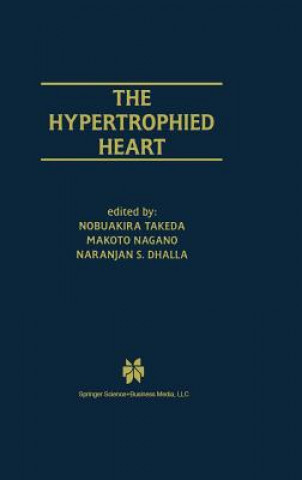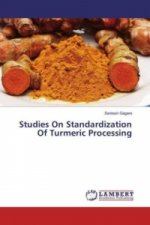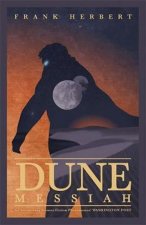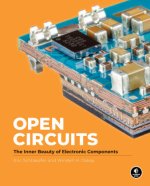
Kod: 03612937
Progress in Experimental Cardiology
Autor Nobuakira Takeda, Makoto Nagano, Naranjan S. Dhalla
Whenever the heart is challenged with an increased work load for a prolonged period, it responds by increasing its muscle mass--a phenomenon known as cardiac hypertrophy. Although cardiac hypertrophy is commonly seen under physiol ... więcej
- Język:
 Angielski
Angielski - Oprawa: Twarda
- Liczba stron: 469
Wydawca: Springer, 2000
- Więcej informacji o książce

875.25 zł

Dostępna u dostawcy w małych ilościach
Wysyłamy za 12 - 15 dni
Potrzebujesz więcej egzemplarzy?Jeżeli jesteś zainteresowany zakupem większej ilości egzemplarzy, skontaktuj się z nami, aby sprawdzić ich dostępność.
Dodaj do schowka
Zobacz książki o podobnej tematyce
-

Cloud Forest
88.82 zł -23 % -

Studies On Standardization Of Turmeric Processing
236.22 zł -4 % -

1500-Calorie-a-Day Cookbook
108.07 zł -2 %
Podaruj tę książkę jeszcze dziś
- Zamów książkę i wybierz "Wyślij jako prezent".
- Natychmiast wyślemy Ci bon podarunkowy, który możesz przekazać adresatowi prezentu.
- Książka zostanie wysłana do adresata, a Ty o nic nie musisz się martwić.
Więcej informacji o Progress in Experimental Cardiology
Za ten zakup dostaniesz 509 punkty
 Opis
Opis
Whenever the heart is challenged with an increased work load for a prolonged period, it responds by increasing its muscle mass--a phenomenon known as cardiac hypertrophy. Although cardiac hypertrophy is commonly seen under physiological conditions such as development and exercise, a wide variety of pathological situa tions such as hypertension (pressure overload), valvular defects (volume overload), myocardial infarction (muscle loss), and cardiomyopathy (muscle disease) are also known to result in cardiac hypertrophy. Various hormones such as catecholamines, thyroid hormones, angiotensin II, endothelin, and growth factors have also been shown to induce cardiac hypertrophy. Although the exact mechanisms underlying or pathological forrns of cardiac hypertrophy are poorly under the physiological stood, an increase in the intraventricular pressure is believed to represent the major stimulus for the development of cardiac hypertrophy. In this regard, stretching of the cardiac muscle has been shown to induce the hypertrophic response, but the role of metabolic influences in this process cannot be ruled out. Furthermore, different hormones and other interventions in the absence of stretch have been observed to stimulate protein synthesis in both isolated cardiomyocyte and vascular myocyte preparations. Nonetheless, it is becoming dear that receptor as well as phospholipid linked signal transduction pathways are activated in some specific manner depend ing upon the initial hypertrophic stimulus, and these then result in an increase in the size and mass of cardiomyocytes.
 Szczegóły książki
Szczegóły książki
875.25 zł
- Pełny tytuł: Progress in Experimental Cardiology
- Autor: Nobuakira Takeda, Makoto Nagano, Naranjan S. Dhalla
- Język:
 Angielski
Angielski - Oprawa: Twarda
- Liczba stron: 469
- EAN: 9780792377412
- ISBN: 0792377419
- ID: 03612937
- Wydawca: Springer
- Waga: 928 g
- Wymiary: 235 × 155 × 35 mm
- Data wydania: 30. September 2000
Ulubione w innej kategorii
-

Dune
34.87 zł -33 % -

Haunting Adeline
125.92 zł -1 % -

Berserk Deluxe Volume 2
212.83 zł -1 % -

White Nights
15.42 zł -23 % -

Powerless
47.28 zł -14 % -

Atomic Habits
59.27 zł -26 % -

Dune Messiah
46.37 zł -3 % -

Berserk Deluxe Volume 3
215.25 zł -1 % -

One Day
32.66 zł -36 % -

Berserk Deluxe Volume 1
212.02 zł -2 % -

Iron Flame
63.01 zł -26 % -

Surrounded by Idiots
37.80 zł -26 % -

Harry Potter and the Prisoner of Azkaban (Minalima Edition)
170.59 zł -2 % -

Gravity Falls Journal 3
89.72 zł -

Heaven Official's Blessing: Tian Guan Ci Fu (Novel) Vol. 1
89.12 zł -1 % -

The Creative Act
100.31 zł -15 % -

Dune
47.38 zł -23 % -

Hunting Adeline
86.80 zł -34 % -

A Little Life
47.28 zł -14 % -

Children of Dune
46.77 zł -2 % -

Heaven Official's Blessing: Tian Guan Ci Fu (Novel) Vol. 2
86.80 zł -3 % -

Bungo Stray Dogs, Vol. 8 (light novel)
65.83 zł -4 % -

Percy Jackson and the Olympians 5 Book Paperback Boxed Set
185.71 zł -5 % -

Solo Leveling, Vol. 1
86.80 zł -3 % -

The Prisoner's Throne
34.87 zł -31 % -

Court of Thorns and Roses
43.45 zł -15 % -

Cry Baby Coloring Book
47.38 zł -1 % -

Fourth Wing
56.65 zł -26 % -

Icebreaker
35.18 zł -26 % -

Berserk Deluxe Volume 6
215.25 zł -1 % -

Avatar, the Last Airbender: The Kyoshi Novels (Box Set)
169.38 zł -2 % -

The 48 Laws of Power
101.72 zł -12 % -

House of Leaves
85.89 zł -33 % -

Twisted Lies
37.80 zł -26 % -

Dune Messiah
38.10 zł -33 % -

No Longer Human
58.57 zł -5 % -

48 Laws Of Power
61.19 zł -28 % -

Twisted Games
37.80 zł -26 % -

Caraval Paperback Boxed Set
175.73 zł -3 % -

Solo Leveling, Vol. 2
75.10 zł -23 % -

Open Circuits
169.78 zł -2 % -

Berserk Deluxe Volume 5
152.74 zł -29 % -

Heaven Official's Blessing: Tian Guan Ci Fu (Novel) Vol. 3
77.32 zł -14 % -

Berserk Deluxe Volume 4
222.01 zł -23 % -

Court of Mist and Fury
36.59 zł -26 % -

SOLO LEVELING V08
88.51 zł -2 % -

English File Upper Intermediate Multipack A (4th)
100.71 zł -

CHAINSAW MAN V14
42.94 zł -23 % -

Before the Coffee Gets Cold
33.97 zł -26 %
zadowolonych klientów
Od roku 2008 obsłużyliśmy wielu miłośników książek, ale dla nas każdy był tym wyjątkowym.
Copyright! ©2008-24 libristo.pl Wszelkie prawa zastrzeżonePrywatnieCookies


 21 milionów książek
21 milionów książek Dostawa 10.99 zł
Dostawa 10.99 zł (32) 444 93 66 (8-15.30h)
(32) 444 93 66 (8-15.30h)